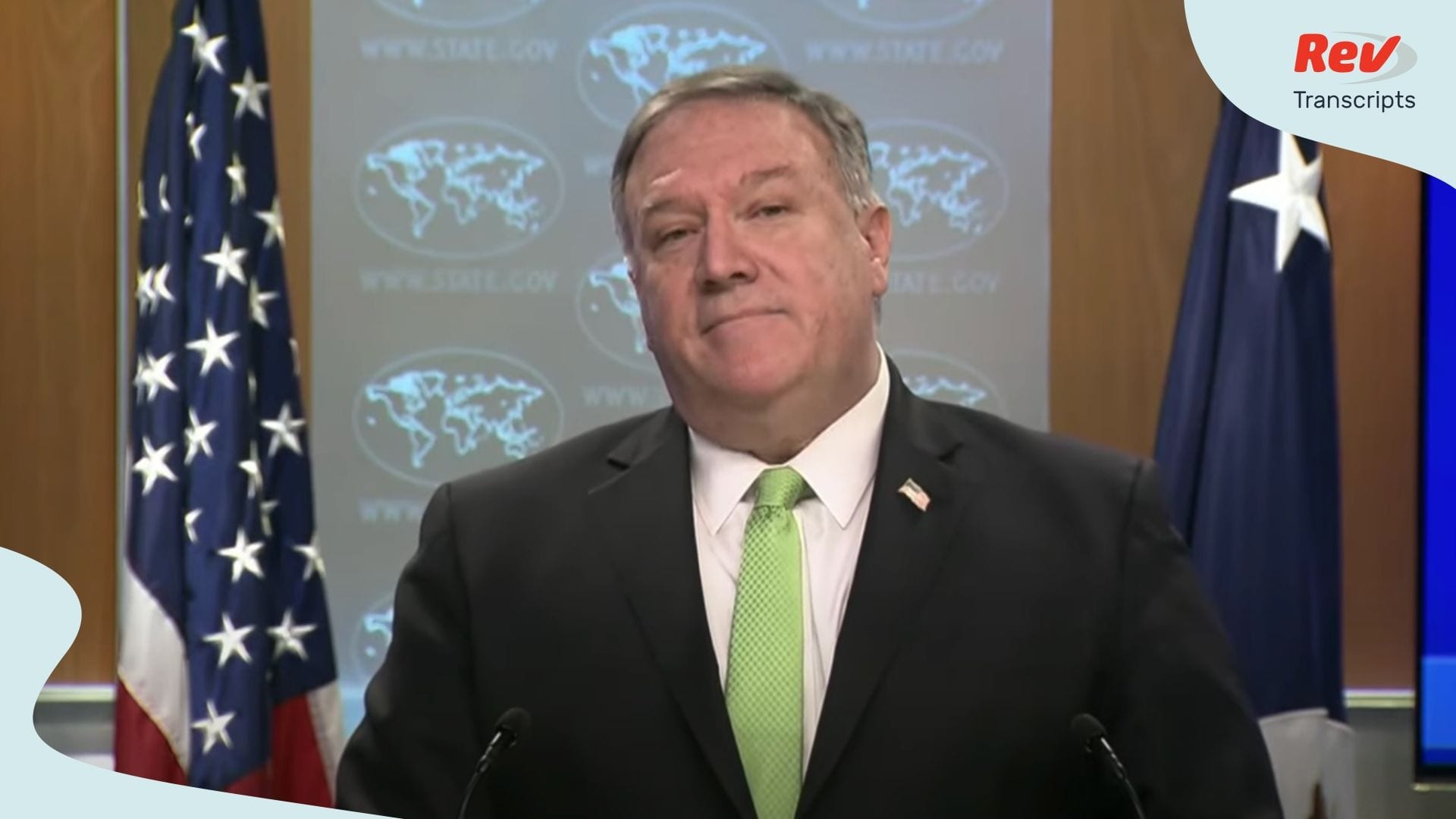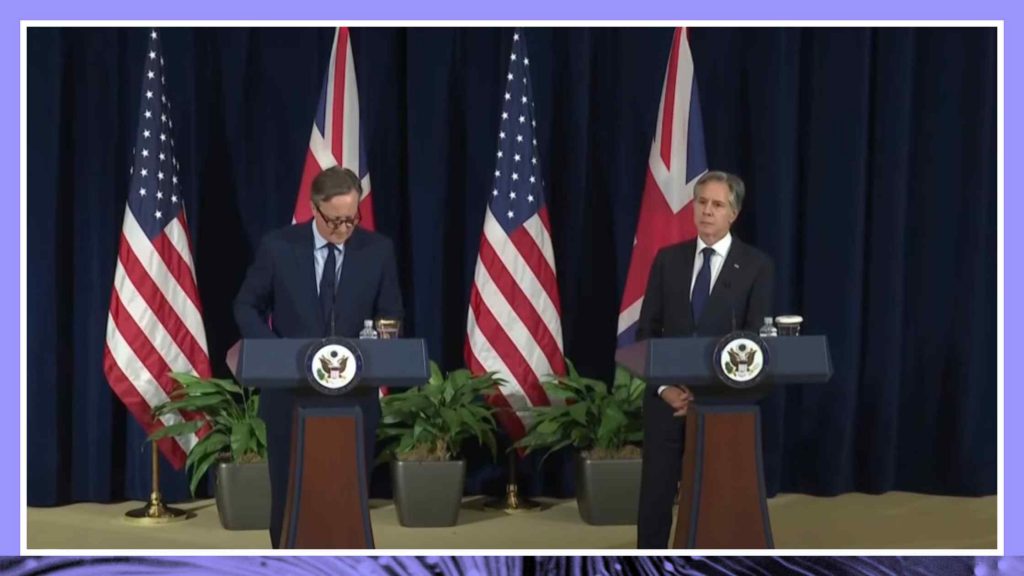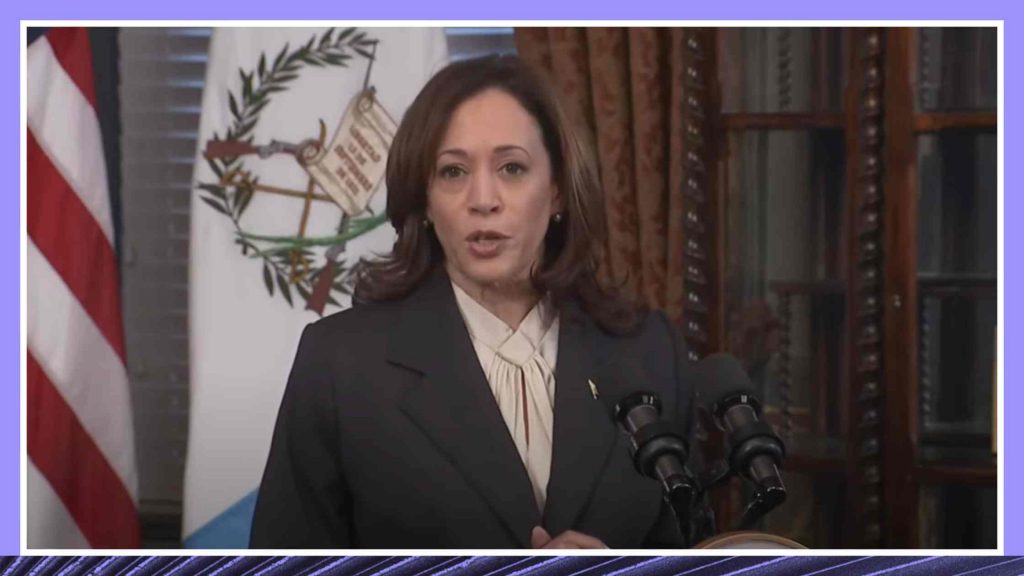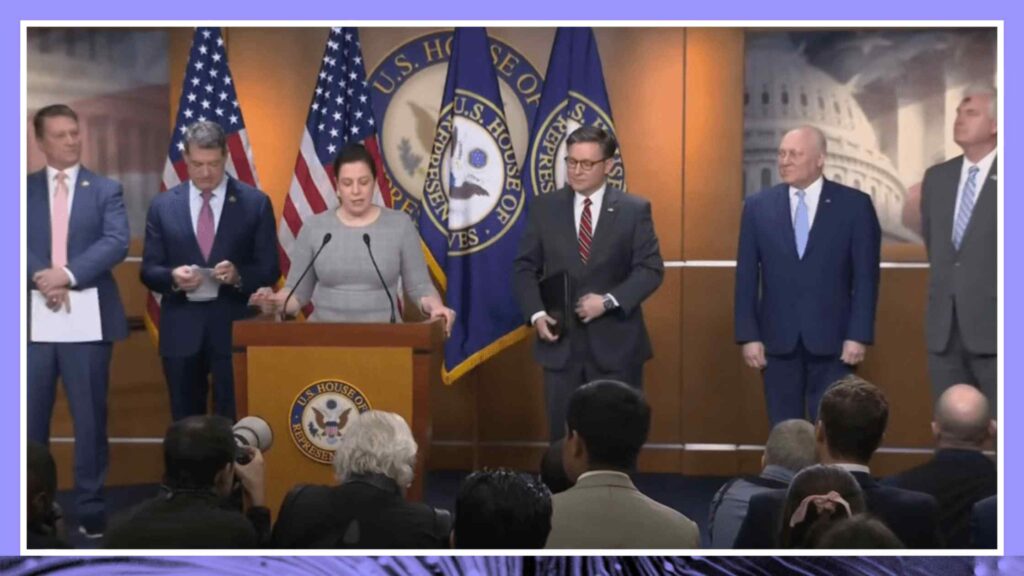May 20, 2020
Mike Pompeo Press Conference Transcript – Talks Inspector General Firing

Secretary of State Mike Pompeo held a press briefing today, his first since the firing of State Department Inspector General & watchdog Steve Linick. Pompeo said the firing should have happened “a long time ago.” Read the transcript here.
Transcribe Your Own Content
Try Rev for free and save time transcribing, captioning, and subtitling.
Mike Pompeo: (00:06)
Good morning, everyone. This morning, early, I had the chance to drive through Arlington Cemetery, and as we approach Memorial Day weekend, I want to reflect on the sacrifices of our uniformed military, who have given their lives in the cause of freedom. As the Secretary of State and an Army veteran, I spend all my days working to use American diplomatic power to secure freedom without putting our service members in harm’s way. I want to recognize and thank the families who have lost loved ones in service to our country for their sacrifices, too, from Lexington to Leyte Gulf, from Valley Forge to the [inaudible 00:00:42] Valley and all the other fields of battle. I hope every American will reflect on the exceptional nation for which these warriors fought and died so that we can live and enjoy the fruits of this great country.
Mike Pompeo: (00:56)
I want to begin today with a few observations on China, because the media’s focus on the current pandemic risks missing the bigger picture of the challenges presented by the Chinese Communist Party.
Mike Pompeo: (01:08)
First, basic facts. China has been ruled by a brutal authoritarian regime, a Communist regime, since 1949. For several decades, we thought the regime would become more like us through trade, scientific exchanges, diplomatic outreach, letting them in the WTO as a developing nation. It didn’t happen. We greatly underestimated the degree to which Beijing is ideologically and politically hostile to free nations. The whole world is waking up to that fact.
Mike Pompeo: (01:38)
Pew reported, I think it was this past week, that 66% of Americans have an unfavorable view of China. That is a direct result of the Chinese Communist Party’s choices, which are influenced by the nature of the regime, and the nature of that regime is not new.
Mike Pompeo: (01:55)
Second point on the bigger picture: The Chinese Communist Party’s response to the COVID-19 outbreak in Wuhan have accelerated our more realistic understanding of Communist China. The party chose to destroy live virus samples instead of sharing them or asking us to help secure them. The People’s Liberation Army has claimed more features in the South China Sea’s international waters, sank a Vietnamese fishing boat, threatened a Malaysian energy prospector, and declared a unilateral fishing ban. The United States condemns these unlawful acts.
Mike Pompeo: (02:32)
The Chinese Communist Party chose to threaten Australia with economic retribution for the simple act of asking for an independent inquiry into the origins of the virus. It’s not right. We stand with Australia and the more than 120 nations now who have taken up the American call for an inquiry to the origins of the virus so we can understand what went wrong and save lives now and in the future.
Mike Pompeo: (02:57)
The Chinese Communist Party also chose to pressure the World Health Organization’s Director General into excluding Taiwan from this week’s World Health Assembly in Geneva. I understand that Dr. Tedros; unusually close ties to Beijing started long before this current pandemic, and that’s deeply troubling.
Mike Pompeo: (03:15)
President Xi claimed this week that China’s acted with openness, transparency, and responsibility. I wish it were so. It’s been 142 days since doctors at Wuhan Central Hospital first started sharing information about a SARS-like virus. Yet, today, as we all sit here this morning, Beijing continues to deny investigators access to relevant facilities, to withhold live virus samples, to censor discussion of the pandemic within China, and much, much more. If the Chinese Communist Party wants to demonstrate real openness, real transparency, it could easily hold a press conference, like this very press conference, and allow reporters to ask him anything that they would like.
Mike Pompeo: (03:55)
Third, China’s contributions to fighting the pandemic are paltry compared to the cost that they have imposed on the world. This plague has cost roughly 90,000 American lives. More than 36 million Americans have lost their jobs since March. Globally, 300,000 lives. Could be as much as $9 trillion, according to our estimates cost imposition on the world by the Chinese Communist Party’s failures. The United States has responded with about $10 billion to benefit the international response, everything from vaccine research to funding for preparedness efforts and humanitarian aid. That’s compared to a promise of $2 billion from the Chinese. I look forward to seeing them fulfill that $2 billion commitment.
Mike Pompeo: (04:41)
Private American businesses to nonprofits, charities, citizens have provided an additional $4.3 million from American donations to assist the world. There is no country that remotely rivals what the United States has done to help combat this terrible virus.
Mike Pompeo: (04:55)
Today, I’m pleased to announce another 162 million in foreign assistance, bringing our total commitments dispersed to more than $1 billion since the outbreak began. That’s just what the State Department and the USDA have done. In addition to that funding, today, the State Department and USDA and the Inter-American Foundation are providing more than 200 million in assistance for the Venezuelans in need as well. This is what we do all around the world. We will help the world recover from this pandemic.
Mike Pompeo: (05:23)
Turning for a moment to Taiwan, I want to say congratulations to President Tsai on her inauguration. The democratic process in Taiwan has matured into a model for the world. Despite great pressure from outside, taiwan has demonstrated the wisdom of giving a people a voice and a choice.
Mike Pompeo: (05:38)
In Hong Kong, our decision on whether or not to identify Hong Kong as having a high degree of autonomy from China is still pending. Closely watching what’s going on there. This week, pro-democracy legislators were manhandled while trying to stop a procedural irregularity by pro-Beijing legislators. Leading Hong Kong activists like Martin Lee and Jimmy Lai were hauled into court. Actions like these make it more difficult to assess that Hong Kong remains highly autonomous from mainland China.
Mike Pompeo: (06:10)
We’re also keeping a close eye on human rights, as we always do, pandemic or no pandemic. I was pleased that France arrested this weekend Felicien Kabuga, who was alleged to have played a key role in the Rwandan genocide. We’re monitoring Burundi as voters there go to the polls today. I urge all sides to refrain from provocations and allow there to be an election with no violence to let every citizen have the opportunity to exercise their democratic rights.
Mike Pompeo: (06:38)
Nicaragua, too. We’re concerned about numerous credible reports of hospitals filling up and bodies being buried under cover of night, pointing to a much more severe situation than the regime is actually acknowledging, and we’re concerned that individuals around the world, individuals, including journalists, have been arrested and detained based on their public statements or activities regarding COVID-19. The United States condemns all such uses of the pandemic around the world as a pretext for repression.
Mike Pompeo: (07:07)
Onto better news. Last week saw three huge diplomatic wins. I’d like to highlight them. First, last week, the United States shipped its first ever crude oil to Belarus. I traveled there a few months back. I made the commitment that we would work on this project with them so they would be less dependent on crude oil from those who see the world a little bit differently. This deal will allow Belarus to diversify its supplies, to go forward and take crude off from free nations. We’re the largest producer of oil and gas in the world. If nations want enhanced energy security and deals crafted with a respect for property rights and free enterprise and the rule of law, come talk to us. We’ll get it done with you.
Mike Pompeo: (07:43)
Second, in Afghanistan, the United States welcomes the political settlement by President Ghani and Dr. Abdullah. We urge the two leaders to channel momentum generated by this positive outcome to speed up the government’s entry into inter-Afghan negotiations. We need all sides, including the Taliban, to do their part to get into talks. We need violence reduced. We’re working hard to meet the critical objective of getting peace and reconciliation inside of Afghanistan.
Mike Pompeo: (08:10)
Third, I’m really proud of the team here at the State Department and the Commerce Department who worked hard to help bring Taiwan’s semiconductor manufacturing corporations a new $12 billion investment for a new state-of-the-art chip foundry to Arizona. Microchips integral to all our national security will be made in America again. That deal was a piece of and an integral part of a string of accomplishments that we call the 5G National Security Trifecta, something we’ve been working on for some time. Last week, the United States closed a loophole Walway had used a circumvent export controls by designing and producing semiconductors abroad.
Mike Pompeo: (08:47)
Third, the third part of the trifecta is something I’ve mentioned before, the 5G Clean Path. 5G data transiting American diplomatic facilities must only transit through trusted equipment. I had a good conversation with Secretary Esper this week on the importance of making sure our military bases participate in the 5G Clean Path initiative as well.
Mike Pompeo: (09:10)
I want to update you on our maximum pressure campaign against the Islamic Republic of Iran, too. Tomorrow marks 24 months, two years since I launched the campaign to get Iran to behave like a normal nation. We continue to follow through on that commitment. On June 8th, our designation of Islamic Republic of Iran shipping lines goes into effect. Last week, United States government provided the maritime and energy industries new guidance to reduce their risk of exposure to sanctionable activities related to Iran, as well as those regarding North Korea and Syria. The world’s maritime community has warned doing business with these vessels risks severe consequences. Our maximum pressure campaign also entails demanding that the regime in Tehran treat its own people with respect and dignity.
Mike Pompeo: (09:53)
Today, the United States announces that it’s imposing sanctions on 12 Iranian individuals and entities under the human rights authorities. One of those sanctions is the current Minister of Interior for Iran, Abdolreza Rahmani Fazli. We have reason to believe that he is the individual who gave orders in November 2019 authorizing Iranian police forces to use lethal force on peaceful protesters inside of Iran. His evil commands killed Iranian citizens. We’re proud to mete out what justice we can on behalf of the slain and silenced inside of Iran.
Mike Pompeo: (10:30)
Finally, we’ve just marked the sad anniversary of six years since Paul Overby’s disappearance in Afghanistan. Our colleagues at the FBI have renewed their $1 million offer for information relating to his return, and my team continues to press towards that goal through diplomatic channels as well. The wellbeing of American citizens comes first to this President, to this administration. With that, I’m happy to take a few questions. Hi. Good morning.
Reporters: (10:59)
On Taiwan, you mentioned that the democratically elected Taiwan president, Tsai Ing-wen, a few hours ago inaugurated to continue her second term.
Mike Pompeo: (11:11)
Yeah.
Reporters: (11:12)
We saw a video message from the Deputy National Security Advisor, Pottinger, in Mandarin Chinese, and we saw a video message from Assistant Secretary Stilwell and your statement to congratulate Taiwan. My question for you is how does the United States envision its relationship with Taiwan and Taiwan’s global participation after [inaudible 00:11:39] in the coming years?
Reporters: (11:42)
Secretary, if I may, President Trump mentioned last week that the US may cut of all relationship with China. Would you like to weigh in your thoughts? Should the United States ponder an official relationship with Taiwan based on a shared values of democracy, religious freedom, and human rights? Thank you.
Mike Pompeo: (12:10)
So we congratulated the winner of the election there. We were happy to see that. My congratulations were in English, not Mandarin. It was the best that I could do. But we understand that the work that we have done there, and it comports with the history of the agreements between the United States and China, is the right solution to maximize the stability there in the staits.
Mike Pompeo: (12:36)
The President talked about how we’re going to respond, how he’s beginning to think about responding to the calamity that has befallen the world as a result of the actions of the Chinese Communist Party. I don’t want to get ahead of him in terms of talking about how the administration will respond to that, but you can already begin to see the outlines of it.
Mike Pompeo: (12:56)
I talked about this with our 5G national security trifecta. You can already see how we’re beginning to work to make sure we get America first, that we get this foreign policy right, and that we respond to these risks that the Chinese Communist Party presents to the United States and in appropriate way.
Mike Pompeo: (13:12)
You saw yesterday, I think it was, or maybe it was the day before the Department of Defense make announcements about work on rare earth minerals so that, again, we wouldn’t be dependent on a nation that has demonstrated its unreliability, its willingness to steal our intellectual property, all the things that, frankly, for decades … and this isn’t remotely partisan. Democrat presidents, Republican presidents, all just turned the other way, because, at one point, five billion people and the opportunity for enormous markets and this hope, this hope that engagement would lead to a change in the behavior of the Chinese Communist Party, it didn’t happen.
Mike Pompeo: (13:49)
President Trump has been incredibly serious about making sure that we do the right things for the American people. I know he’ll continue to do it. We continue to work on this to develop an appropriate way to think about how we can get the Chinese Communist Party and China to behave in a way that’s consistent with how we ask every nation to behave.
Reporters: (14:07)
Sorry. Go ahead.
Reporters: (14:09)
Thank you, Morgan. Thank you, Mr. Secretary. Mr. Secretary-
Mike Pompeo: (14:12)
Hello, sir.
Reporters: (14:12)
… last night, the Palestinian authority, President Mahmoud Abbas, abrogated all agreements with Israel and the United States, including security coordination. Do you have any comment on that, and would you also comment on the process or the progress of annexation per the announcement by Mr. Netanyahu that he will do so-
Mike Pompeo: (14:34)
Sure.
Reporters: (14:34)
… by July 1? Thank you, sir.
Mike Pompeo: (14:36)
Yeah, sure. So we note the announcement by Abbas. I was in communication today with our teams there. We hope that the security arrangements will continue to be in place, that the work that’s done on the ground there to keep people in Israel and Palestinians safe will continue. So I’m not exactly sure what to make of his statement, but I regret that he’s decided to abrogate these agreements. We laid out a very clear vision for how peace could be brought. We asked simply for this: We asked the Israelis and the Palestinians to agree that that would be the basis for negotiations between them. The Israelis have accepted that. The Palestinians have continued to refuse to just simply sit down and enter into negotiation based on President Trump’s vision for peace there.
Mike Pompeo: (15:26)
We know that vision for peace will lead to better lives for the Palestinian people. It acknowledges that in a very clear and unambiguous way. We hope that the leadership and the Palestinian authority will see that that’s in their people’s best interest and that we can move out in that way, according to the vision that was laid out.
Mike Pompeo: (15:46)
But the last thing to say is I was in Israel last week. We had conversations about how we can move this vision for peace forward, and we’re going to continue to work with all the parties involved to try to get that ultimate outcome. You can see how the Middle East has changed. You can see how you now have the most antisemitic country in the world, the Islamic Republic of Iran, pitted against Arab nations in Israel who understand that the great threat in the Middle East is very different than it may have been decades ago. That threat now emanates from Iran, and you can see these other nations working together to ensure that we take down risk throughout the Middle East. The President’s vision for peace there is an important component of that.
Reporters: (16:30)
Has anyone spoken to the Palestinians, sir?
Mike Pompeo: (16:33)
I don’t have anything to … Thank you.
Reporters: (16:36)
Go ahead, Rich.
Mike Pompeo: (16:36)
Hi, Rich.
Reporters: (16:39)
Several Senate Republicans say they want a specific explanation as to why the administration fired the Inspector General here. Senator Grassley says an expression of lost confidence without further explanation is not sufficient to fulfill the requirements of the IG Reform Act. Will you provide Congress a more detailed explanation on why you recommended the firing to the President, and will the State Department make the House Foreign Affairs Committee deadline for documents this Friday at five?
Mike Pompeo: (17:07)
So there’s been lots of discussion about this. I’ve read a number of reports. Let me say three things. First, the President has the unilateral right to choose who he wants to be his Inspector General at every agency in the federal government. They are presidentially confirmed positions, and those persons, just like all of us, serve at the pleasure of the President of the United States. In this case, I recommended to the President that Steve Linick be terminated. I frankly should have done it some time ago.
Assistant: (17:44)
I think I’ve got to get you out, sir.
Mike Pompeo: (17:47)
I’m happy to take one more.
Assistant: (17:48)
Okay. Perfect. Go ahead.
Reporters: (17:50)
So you have said, sir, that Mr. Linick was undermining the department’s mission. What exactly does that mean? Can you give us examples? Even the President doesn’t know what that means. He says he didn’t really know [inaudible 00:18:03] before you mentioned it. So what specifically has Mr. Linick done?
Mike Pompeo: (18:07)
Yeah. Yeah, unlike others, I don’t talk about personnel matters. I don’t leak to y’all.
Reporters: (18:12)
So did he-
Mike Pompeo: (18:12)
Yeah, I’ll just say this. I can’t talk. I can’t give you specificity. We’ll share with the appropriate people the rationale, but there should be no mistake.
Reporters: (18:23)
[crosstalk 00:18:23] possibility … Official, is it a secret as to why he was fired?
Mike Pompeo: (18:26)
May I answer the question, if you will? I appreciate the question. Let’s be clear. There are claims that this was for retaliation for some investigation that the Inspector General’s office here was engaged in. That’s patently false. I have no sense of what investigations were taking place inside the Inspector General’s office. Couldn’t possibly have retaliated for all the things … I’ve seen the various stories that someone was walking my dog to sell arms to my dry cleaner, right? I mean, it’s all just crazy. It’s all crazy stuff.
Reporters: (18:57)
Sir-
Mike Pompeo: (18:58)
So I didn’t have access to that information, so I couldn’t possibly have retaliated. It would have been impossible. There’s one exception. I was asked a series of questions in writing. I responded to those questions with respect to a particular investigation that was sometime earlier this year, as best I can recall. Responding to those questions, I don’t know the scope. I don’t know the nature of that investigation, other than what I would have seen from the nature of the questions that I was presented. I did what was right. I don’t know if that investigation is continuing. I don’t know if that investigation has been closed out. I don’t have any sense of that. Again, it’s not possible for it to have been retaliation.
Mike Pompeo: (19:35)
Here’s the last thing to think about as you see these stories that have been leaked to you all, right, to the press. This is all coming through the office of Senator Menendez. I don’t get my ethics guidance from a man who was criminally prosecuted, case number 15-155, New Jersey Federal District Court, a man for whom his Senate colleagues, bipartisan, said, basically, that he was taking bribes. That’s not someone who I look to for ethics guidance. So I’ll continue to do the right thing to make sure the State Department is served by every employee, including our Inspector General, and we’ll make sure the State Department continues to deliver on behalf of the American people.
Reporters: (20:14)
What about Dr. [inaudible 00:20:13]? What about the House Foreign Affairs Committee, sir?
Assistant: (20:17)
Thank you, sir.
Mike Pompeo: (20:17)
Thank you all. Everybody, have a great day and a wonderful Memorial Day weekend, too. So long.
Reporters: (20:22)
[crosstalk 00:20:22] emergency declaration, though, sir?
Transcribe Your Own Content
Try Rev and save time transcribing, captioning, and subtitling.




